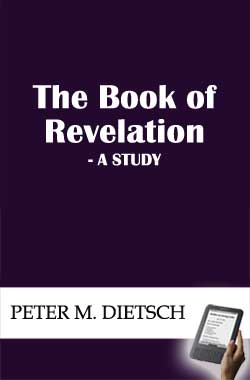 by Peter M. Dietsch
by Peter M. Dietsch
Kindle .mobi or pdf
Dear Church Family,
For many, the most difficult book of the Bible to understand is the final book of the New Testament, the book of Revelation. Written by the Apostle John as a record of a series of visions given to Him by Jesus Christ, this apocalyptic work confounds and scares many Christians. They have heard no end to fanciful interpretations, been given complicated charts, forced to watch cheesy movies about the ‘rapture,’ and warned about the ‘impending tribulation’ which Christians may or may not endure and which will last for three and a half or seven years, depending on who you talk to.
This is because many Christians have grown up in American evangelicalism as dispensationalists. Often they don’t even know it and might not have even heard of the term. For many, dispensationalism was just the normal way of interpreting the Bible. Thus, they are surprised to learn that dispensationalism (as a distinct method of interpreting the Bible) is actually rather new. Dispensationalism originated in the mid-1800s with John Nelson Darby, and has subsequently spread through the proliferation of things like the Scofield and Ryrie Study Bibles.
To get a fuller grasp of the distinctives of dispensationalism, one could probably do no better than to read Vern Poythress’ book Understanding Dispensationalists. The entire book is available to read free online here. While there is some variety of views among dispensationalists, Poythress helpfully summarizes two elements that are central to dispensationalism:
What these men have in common is primarily a particular view of the parallel-but-separate roles and destinies of Israel and the church. Along with this view goes a particular hermeneutical stance, in which careful separation is made between what is addressed to Israel and what is addressed to the church. What is addressed to Israel is ‘earthly’ in character and is to be interpreted ‘literally.’
In Understanding Dispensationalists, Poythress examines and critiques these two elements of dispensationalism (a strong division between Israel and the Church and a faulty view of ‘literal interpretation’ means). Then he goes on to explain the contrast of covenant theology (how the Bible teaches a continuity between Israel and the Church and how the Scriptures are rightly interpreted using a grammatical-historical approach). Again, to better understand dispensationalism, I commend Poythress’ book.
New Book: “The Book of Revelation – A Study”
But the main reason that I bring up the confusion about the Book of Revelation and the error of dispensationalism is because I have had a couple conversations recently about these things. In these conversations, I’ve received questions about Reformed (or covenant) theology, eschatology (the study of the last days), and the book of Revelation. I’ve previously written about how according to the Bible, we have been living in the end times for about two thousand years, since the first coming of Christ. And, I’ve had many conversations over the years like the ones I’ve recently had.
However, these recent conversations have given me the impetus to publish (self-publish, that is) a study of the book of Revelation. In 2013-2014, we studied the book of Revelation in our adult Sunday school class. Those lessons (audio and handouts) are still available online here. But, in an effort to provide a help in reading, interpreting, understanding, and applying the book of Revelation, I’ve put all of those lesson handouts into one document.
This new book – “The Book of Revelation – A Study” – is available to download (as a Kindle e-book or pdf) As the footnotes in the book bear out, most of this new book is a bringing together of various commentaries on Revelation, leaning heavily on my favorite and very readable commentary, More Than Conquerors: An Interpretation of the Book of Revelation by William Hendriksen.
The first chapter of this new e-book that I’ve put together is an examination of the various methods by which Revelation has been interpreted, provides an outline and overview of the book, and establishes particular hermeneutical (or interpretive) principles. The subsequent chapters provide a chapter-by-chapter study of the book of Revelation, interspersed with some excurses on topics such as how to interpret the millennium and the time designations found in Revelation.
Conclusion
While many find the book of Revelation confusing and scary, William Hendriksen begins his commentary describing it as “serenely simple, yet beautiful in its very simplicity.” My hope and prayer is that this new e-book will help to bring clarity such that more Christians will come to embrace the simplistic beauty of the book of Revelation.
The Lord be with you!
- Pastor Peter M. Dietsch
Peter M. Dietsch is pastor of Providence PCA in Midland, Texas
